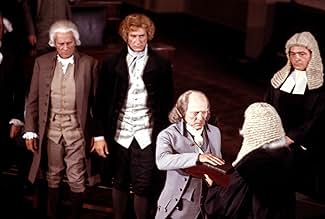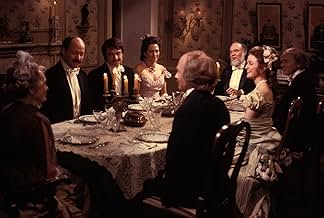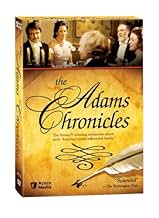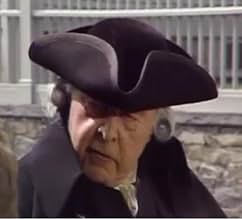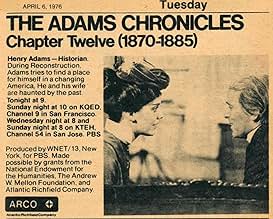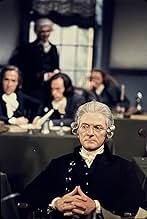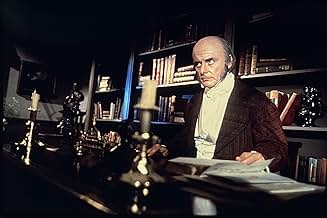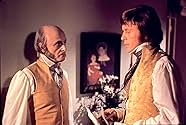This ambitious multi-part PBS production brings to life five generations of one of America's leading political and historical families, tracing their lives from John Adams' years as a coloni... Read allThis ambitious multi-part PBS production brings to life five generations of one of America's leading political and historical families, tracing their lives from John Adams' years as a colonial Boston attorney to the rise in prominence of Brookes Adams in the fields of political a... Read allThis ambitious multi-part PBS production brings to life five generations of one of America's leading political and historical families, tracing their lives from John Adams' years as a colonial Boston attorney to the rise in prominence of Brookes Adams in the fields of political and social philosophy. This mini looks into their triumphs and tragedies, exploring their g... Read all
- Won 4 Primetime Emmys
- 4 wins & 17 nominations total
Featured reviews
You get to know four generations of the Adams family and their places in history (as well as their personal lives) without getting bogged down in unnecessary detail. If you want to learn more, there's always books you can read.
All the acting was excellent, and it was interesting to see William Daniels playing John Quincy Adams, when not too long before that, he played his father, John Adams, in the movie "1776". (He also played John Adams again in another TV miniseries around that same time, and later on he was in a series where he played the principal of John Adams high school. Do you detect a pattern here???
Don't miss this one!
From a list of the episodes, one gets a sense of the scope of the Chronicles: (1) John Adams, Lawyer (1758-1770); (2) John Adams, Revolutionary (1770-1776); (3) John Adams, Diplomat (1776-1783); (4) John Adams, Minister to Great Britain (1784-1787); (5) John Adams, Vice President (1788-1797); (6) John Adams, President (1797-1801); (7) John Quincy Adams, Diplomat (1809-1815); (8) John Quincy Adams, Secretary of State (1817-1825); (9) John Quincy Adams, President (1825-1829); (10) John Quincy Adams, Congressman (1831-1848); (11) Charles Francis Adams, Minister to Great Britain (1861-1868); (12) Henry Adams, Historian (1870-1885); (13) Charles Francis Adams, II, Industrialist (1886- 1893).
The final three episodes focus on men with disparate concerns. These men went separate ways, and met separate frustrations. They did indeed experience what Nagel called a "descent from glory." As Charles Francis Adams, Sr., reflects after dreaming of his grandfather's role in the Revolutionary Era, "In those days, the fate of one man could be the fate of a country." Or, as Charles Francis Adams, II, remarks to Henry Adams, "Perhaps the models we placed ourselves against were larger than life." But perhaps the Adams family was merely living out what John Adams had predicted for nations: "There is no special providence for us. We are not the Chosen People that I know of. We must and shall go the way of the earth."
A few observations on the historical accuracy of the Chronicles are in order. First, they were prepared in cooperation with the Massachusetts Historical Society and the Adams Papers project. Unlike many similar docudramas, they are largely based on original documents--the massive collection of Adams family papers held by the MHS (copies of these filled over 600 reels of microfilm). For example, the criticisms John Adams directed to his fiancé Abigail Smith (not sitting erect, walking with her toes inward, etc.) come directly from a May 7, 1764, document that he bluntly entitled, "a Catalogue of your Faults, Imperfections, Defects, or whatever you please to call them."
Second, viewers should remember that, because they are largely based on the Adams family papers, the Chronicles tend to reflect the views of Adams family members. Thus, in the words of John Adams, Franklin may appear as a "lazy, senile old mischief maker," and Hamilton as an "intriguer." (Those interested in what the Founding Fathers thought about each other should read The Founders on the Founders (2008), edited by John Kaminski.)
Third, only some of the Adams family papers survive—many documents were deliberately destroyed. Work on the family papers began with John Adams, whose comment that they would "make you alternately laugh and cry, fret and fume, stamp and scold," suggests that he did not intend to destroy all the embarrassing records. But some subsequent family members clearly did intend to do so.
Growing up as an Adams was not easy. (John advised John Quincy, "if you do not rise to the head not only of your Profession, but of your Country, it will be owing to your own Laziness, Slovenliness and Obstinacy." When he was 5 or 6, John Quincy wrote to his cousin Elizabeth Cranch (who was a few years older than he), "i have made But veray little proviciancy in reading . . . to(o) much of my time in play (th)ere is a great Deal of room for me to grow better." And John Quincy, after trying to instruct his son Charles Francis, complained, "I find as with his elder brothers a difficulty in fixing his attention." Charles Francis was then two years old.) The Adams children were being trained to be intellectual and moral athletes. Some of those who survived this training did well. But not all survived. Some succumbed to alcoholism, or were fell short for other reasons. Many records relating to these unsuccessful family members have been destroyed. Few of the surviving records relate to John's son Thomas Boylston Adams or John Quincy's son George Washington Adams. Similarly, there remain very few documents about Henry Adams' wife "Clover" Hooper.
The Chronicles attempt to compensate, to some extent, for gaps in the documentary record. But they gloss over mental problems in "Clover's" family. Before "Clover" took her own life, her aunt and her sister had committed suicide, and her brother eventually died in a mental institution after an unsuccessful suicide attempt. Although it is not evident in the Chronicles, Henry's relatives had understandable misgivings about his marrying into the Hooper family.
Given their scope, the Chronicles had to omit and abbreviate much of the Adams story. Missing are John and Abigail's 1787 meeting with Sally Hemings, the reconciliation of Jefferson and Adams after Jefferson's presidency, Brooks Adams' historical writings, or anything about the fourth generation after 1893—Brooks Adams did not die until 1927.
This docudrama was highly successful. It received a total of 11 Emmy Awards, and 17 Emmy nominations (1976 and 1977), only three of which (to George Grizzard, Kathryn Walker, and Pamela Payton-Wright) were for acting. The appearance of certain characters is strikingly realistic (but most of them, from King George to John Calhoun, speak with the same accent). This miniseries provides an interesting glimpse into American history and the Adams family's place in it.
John Adams may have a lot to learn about good PR, but Abigail must have been one of the smartest and well-informed first ladies the US has ever had.
I wish I could buy the video series, but there appears to be none available. The film apparently is available in far-off university libraries throughout the country.
The Chronicles, produced for WNET/PBS New York for the 200 year Centennial Celebration is sitting in the station's vault. It has not been made available for re-airing or DVD, so it's difficult to express some of the most memorable moments. Therefore, whatever is said here, won't matter much as concerns your being able to see the program (at least as of this writing). I'd like to give a tiny bit of how it is now perceived via memory.
The program was perhaps most instrumental in inspiring awe for the greatness of our founders. The costumes were meticulous, the acting superb. It made one very proud to be a part of this great American experiment of freedom.
Seeing the portrayal of the life of four generations of this great family, it was John Adams the patriarch, played by George Grizzard that was the best part of the series (perhaps a part of the first six programs?). Please pardon my memory. When this program gets aired again, I hope to be back with an updated and complete review.
You can help bring it back to life by contacting WNET /13 in New York and PBS. Please do so.
Did you know
- TriviaWilliam Daniels, who plays the elder John Quincy Adams on this series, first played the role of his father, John Adams, in the Broadway and movie versions of the musical "1776".
- ConnectionsFeatured in The 28th Annual Primetime Emmy Awards (1976)
- How many seasons does The Adams Chronicles have?Powered by Alexa
Details
- Release date
- Country of origin
- Language
- Also known as
- The Adams Chronicles
- Filming locations
- Production companies
- See more company credits at IMDbPro
Contribute to this page



